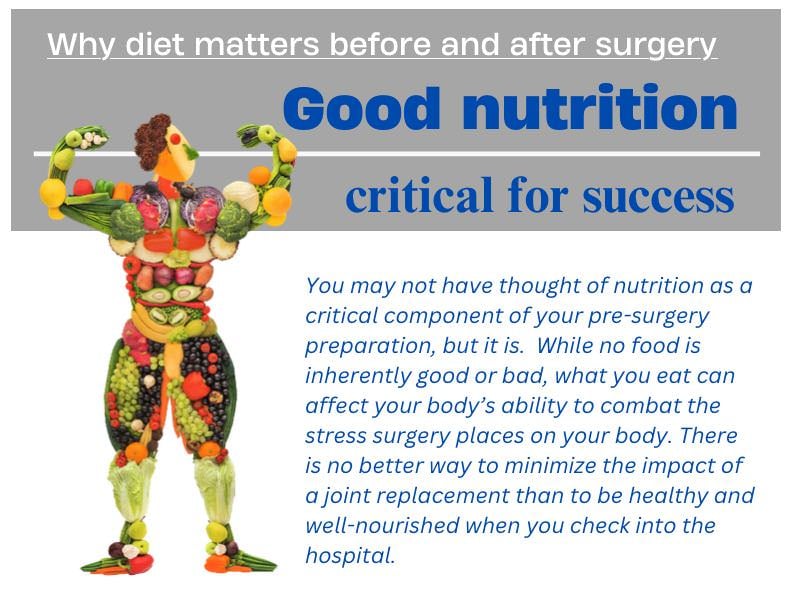
For an average healthy adult, surgery can mean:
- INCREASED ENERGY NEEDS. Your body burns a lot of energy during and after surgery.
- A MAJOR WORKOUT. You burn more glycogen (a form of carbohydrate) during surgery than during a 2 1/2 hour run or bike ride.
- LOWERED IMMUNITY. Surgical stress can weaken your immune system. Eating additional protein as well as omega 3 fat1ty acid and arginine-rich foods (red meat, chicken, turkey, fish, nuts, seeds, whole grains, legumes, and dairy products) support immune health and a more successful recovery.
- UNINTENDED WEIGHT LOSS. After surgery, many people have nausea and don’t feel like eating which can lead to weight loss. Supplements such as Ensure, Boost, or Glucerna can help you get adequate nutrition during this critical time.
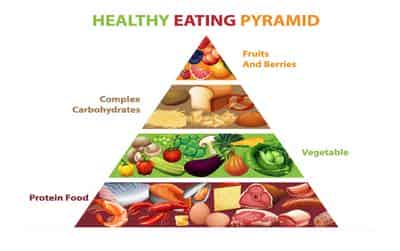
Proper nutrition prior to the big day will help your body repair itself more efficiently and fight off infection as you recover. Of course, any major dietary changes you plan to make should be discussed not only with your surgeon, but also your primary physician. In most cases, you’re going to get a green light to eat the nutritious foods your body will need to perform at its best during the surgical procedure and afterwards in recovery.
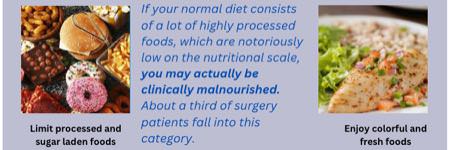
So, what should you eat to be sure you are giving your body the nutrients it needs? The following information will provide a detailed guideline and specific foods to give your body the nutritional boost it needs. The key is to eat a variety of fresh and natural foods as well as limit the amount of fast food, processed snacks and foods, and sugar laden treats you consume. Think plenty of color and variety in what you put on your plate.
Protein is priority #1

Protein is often referred to as the building block of life because it’s found in every cell, tissue, and organ in your body. The amino acids from protein-rich foods promote wound healing by creating new blood and tissue. They also support your immune health and give you strength. Try to get protein in every meal and snack each day.
- Lean meats
- Fish
- Poultry
- Eggs
- Cheese
- Avocado
- Soy products
- Nuts and seeds
- Beans and legumes
- Spinach and kal
- Cauliflower
- Broccoli
Protein Boost Guide
You can get a protein boost from a wide variety of foods. This chart provides examples to get you started. Get creative when you’re preparing meals and snacks – add nuts and seeds to yogurt or oatmeal, make a spinach and cheese omelet, snack on chips and hummus.
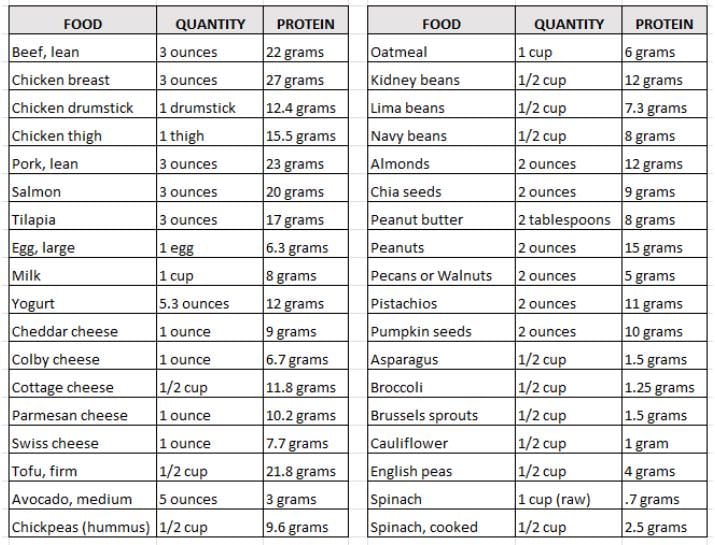
Protein is especially critical during the remodeling stage of healing where new tissue is being created. Maintaining high protein levels helps prevent inflammation and can decrease the chance of developing an infection.

Fat soluble vitamins
Fat soluble vitamins are better absorbed into your body if you eat them along with fats such as a small amount of olive oil used in salad dressing and cooking or butter on top of cooked vegetables.
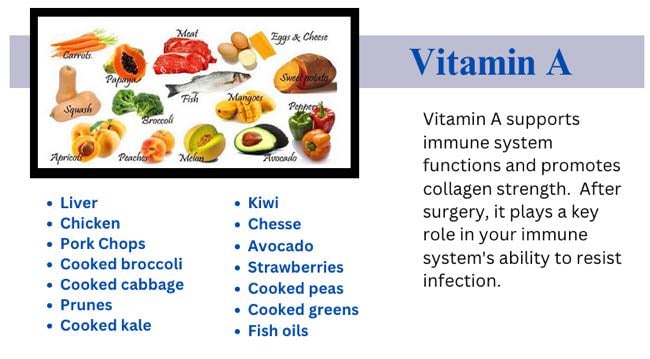
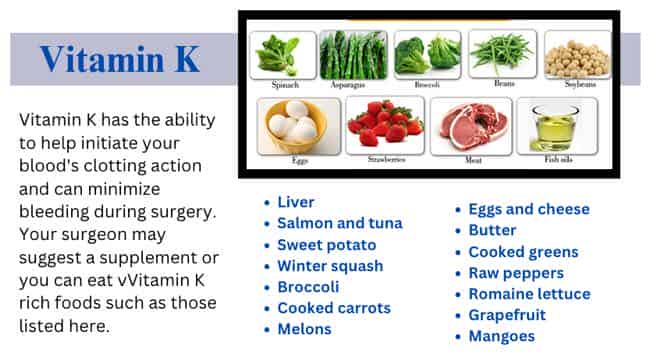
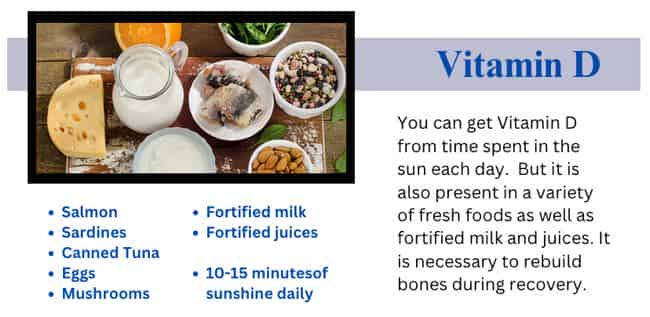
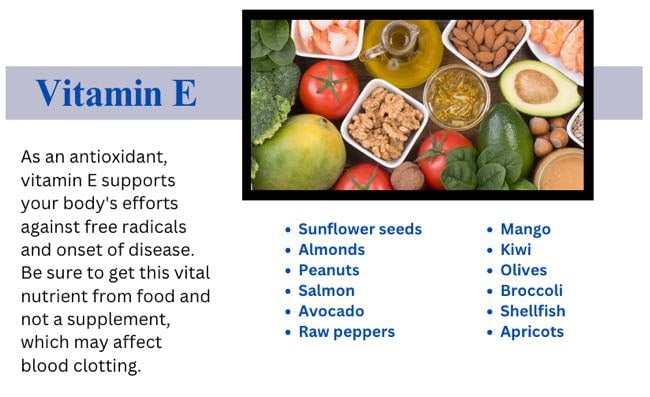
Nutrients needed daily
Vitamin C and Zinc support the healing process and help prevent infection. But both are not retained within your body. So foods rich in these vitamins need to be consumed each and every day to maintain optimum health.
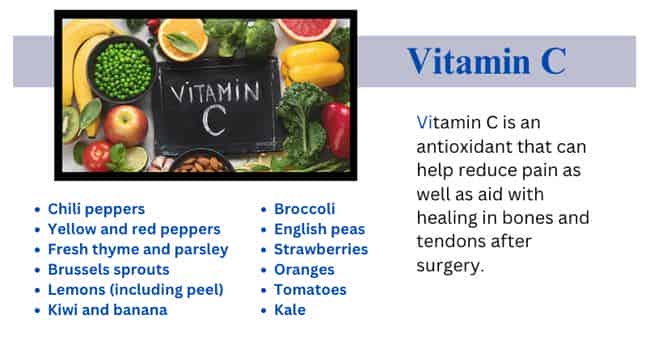
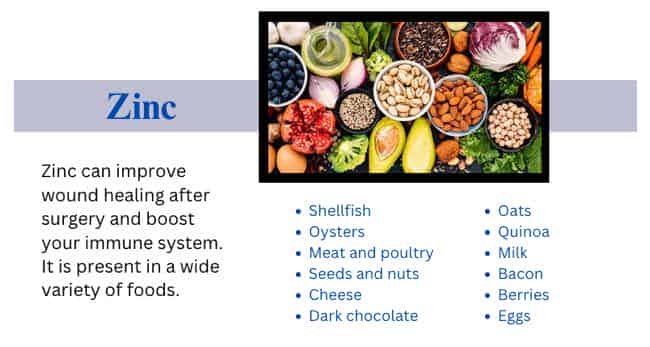
So what do I eat?
If all this leaves you wondering what exactly you should eat to improve your overall health prior to surgery and do well afterwards, don’t be confused.
The key is to eat a variety of fresh and natural foods. Have a good mix of meats or other protein sources, fruits, vegetables, and foods with bulk. No fast food or processed snacks. No soda, fruit drinks, or sugary treats. Aim for 10 servings of fruits and vegetables daily. Limit white foods like potatoes, bread or white rice. You don’t need a complicated diet or to track your nutrient intake before your surgery. Just focus on eating a healthy balanced diet filled with a variety of colorful foods from all the food groups.
- Proteins: fish, chicken, lean red meat, eggs, beans, soy, tofu, nuts
- Grains: whole-wheat bread, brown rice, quinoa
- Vegetables: leafy greens, carrots, broccoli, sweet potatoes, bell peppers
- Fruits: citrus, strawberries, apples, berries, bananas, avocado
- Dairy: milk, cheese, yogurt, fortified plant-milk alternatives to keep bones strong
- Healthy fats: olive oil, avocado, nuts, seeds
- Drink plenty of water to stay hydrated (64-80 ounces daily)
- Eat additional fiber and yogurt to help avoid post-op constipation.
- Iron rich foods help rebuild any blood lost during surgery
- Foods rich in Vitamin C help you absorb iron more efficiently
- Nutrients needed daily
